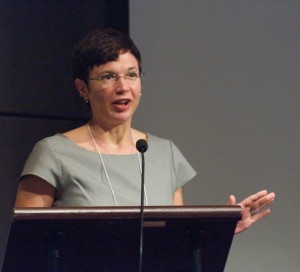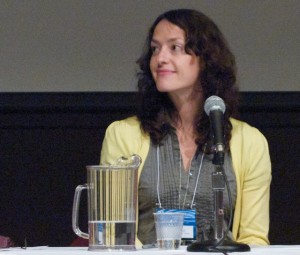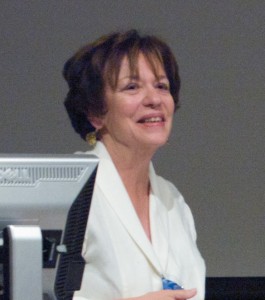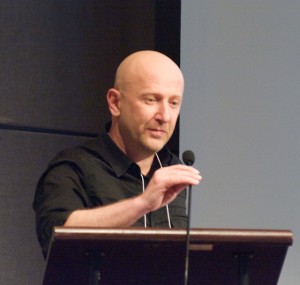July 9, 11:00 AM – Fletcher Challenge Room 1900
Panellists
Barbara Cohen, Director of Humanitech, University of California, Irvine. Steering Group, The Open Humanities Press.
Gary Hall, Professor, Media and Performing Arts, Coventry University, UK. Co-founder of The Open Humanities Press.
Marta Brunner, Librarian for English and American Literature and Comparative Literature at the Charles E. Young Research Library at UCLA
Shana Kimball, Publications Manager in the Scholarly Publishing Office (SPO) at the University of Michigan Library
Session Abstract (Not Applicable)
![]() Logo (source)
Logo (source)
Background
This question period followed a series of presentations related to the Open Humanities Press and two libraries that are supporting their new endeavours of producing single monograph titles. The questions from the audience have been quoted as exactly as possible with the condensed responses from the panel provided underneath.
Relevant Sessions
Part 1 – On Open Humanities Press: A Panel Presentation by Members of the OHP Steering Group
Session Overview
Question 1: How is the OHP dealing with the lack of representations of many cultures and the issue of concentration of media control, such as Thomson Scientific?
Hall replied that he has “huge problems with Thomson Scientific” because all journals have to be registered with them. Younger, less established researchers, or those who are marginalised, cannot publish due to the prohibitive cost. The high price for translating work into English is also impeding academics of other cultures from gaining their due recognition.
Question 2: How do you establish accreditation when the OHP is creating decentralising and destabilising force? Furthermore, if we are in a stage of transition how do we reassure our scholars about the credibility and reliability of open access journals?
Cohen lead the response of the panellists by asserting that we that we have to cope in times of change. We are still retaining some traditions as we move forward, which Bolter refers to as remediation when one media uses the prestige of another to gain credibility (Bolter, 2001). Cohen further asserts that the goal of OHP was to match print quality online: Now it is to surpass it. Kimball then added that experimental works, such as the liquid novel, provided authors with a wider range of options, which benefits everyone. Brunner contended that we need to enthusiastically embrace these trends in order to ensure innovation. Hall argued that the Press is conscious of forging ahead, but that “it also needs to bring people along with it”. Hall stated that there is a tension that exists between being innovative and reassuring scholars that online journals are credible, authoritative sources.
Question 3: How do we give credit and attribution to original authors? How is the author being redefined?
Hall answered that Wikis are collaborative, but there is software that can track input. Hall is actually disappointed in this scenario given that this is a regression of sorts to old traditional authorship. Academics are becoming increasingly involved in open access because it leads to greater prestige for authorship, but again this aligns with old customs that don’t suit the goals of new media.
Question 4: What are the business models for open access monographs? Is grant money part of this equation?
Cohen agreed that grants are important and that as the OHP moves to the monograph series they will be made available. Kimball answered that Michigan State is exploring new revenue streams, but they are operating on the traditional model of rewarding authorship. Hall added that authors are now paying in many cases. Kimball clarified that new alternatives, such as teaching relief, are needed to be offered to reward “gifts of labour” in this new era. Another idea would be to create graduate fellowships or scholarships to do valuable research assistant work. This would work well in libraries because many unknown collections still haven’t been processed. Hall suggested that we “could shift the library model” so that each one publishes its own work and then freely shares it. He concluded that there is no easy access.
Question 5: What are liquid books?
Hall re-established that liquid books are actually referring back to their original status as conglomerations of knowledge. A liquid is fluid and constantly moving, which is why it is an appropriate description for what books really are.
Analysis
The seminal question during this period exposed the issue of how the OHP has to negotiate the contradictory pressures to succumb to traditional models of academic endorsement in order to gain credibility, as well as to provide a vehicle for innovation, originality and modernisation. Furthermore, a press such as the OHP needs to have a business model in order to cover the costs accrued, which is anathema to the ideals of open access proponents. This tension between open and restricted access, or market oriented and non-profit motives, are creating a dialectic series of synthesises that will eventually lead to the pervasiveness of open access content (Schmidt et al., 2005); however, these changes will likely need to retain some features of the old models in order to maintain legitimacy.
Related Links
University of Michigan Scholarly Publishing Office

Gary Hall Discusses His Philosophy with regards to Online Content
References
Bolter, J. D. (2001). Writing space: Computers, hypertext, and the remediation of print. Mahwah, New Jersey: Lawrence Erlbaum Associates.
Schmidt, K. D., Sennyey, P., & Carstens, T. V. (2005). New roles for a changing environment: Implications of open access for libraries. College & Research Libraries, September, Retrieved July 9, 2009, from http://paws.wcu.edu/kschmidt/publications/CandRL.pdf



